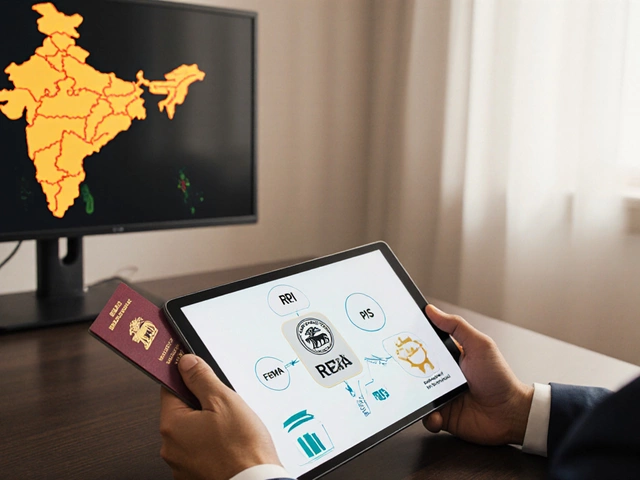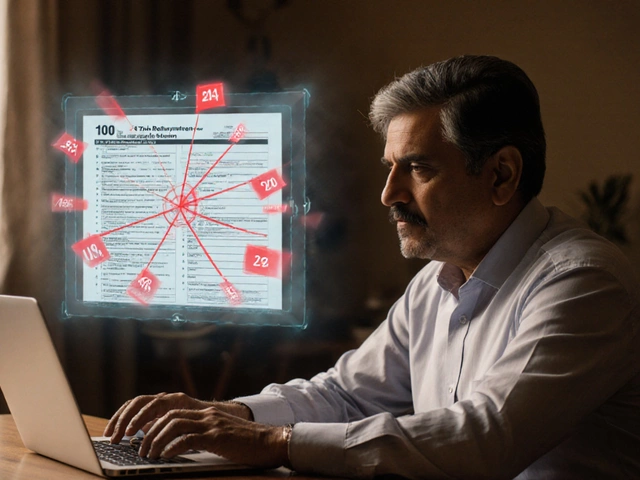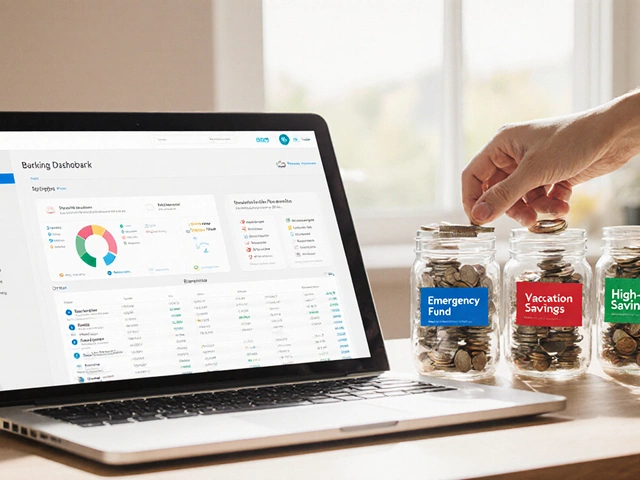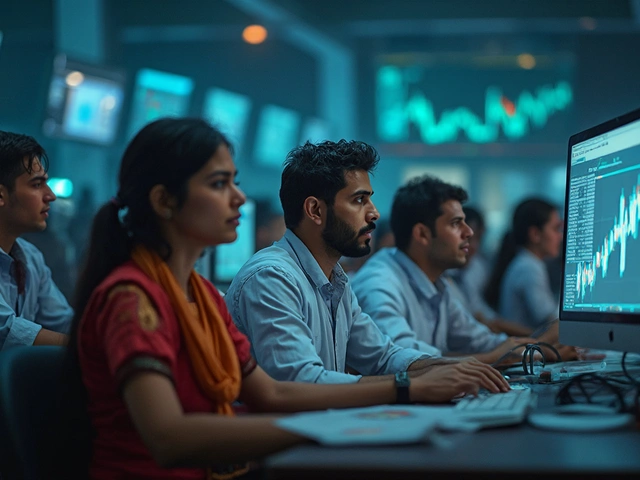
Online banking in India has truly taken off, giving us the convenience of managing money right from our smartphones. But with this convenience comes the need to prioritize security. You're trusting a bank with not just your cash but your personal data as well, so picking the safest option is a no-brainer.
What's the secret sauce that makes a bank 'safe'? First things first, you want to look for a bank that's got a rock-solid reputation. This means it's regulated by well-respected bodies like the Reserve Bank of India (RBI) and adheres to international security standards.
Then, there are all those nifty digital security features like two-factor authentication and encrypted transactions. These aren't just buzzwords—they're what stand between your hard-earned money and some hacker. So, make sure your bank takes these seriously.
- Understanding Bank Safety Measures
- Review of Top Safe Banks in India
- Digital Security Features to Look For
- Tips for Safe Online Banking Practices
Understanding Bank Safety Measures
When it comes to finding the safest bank in India, it's all about understanding what makes a bank secure. It's not just about having a flashy mobile app or a cool website design; there are real, tangible measures banks take to protect your hard-earned money and data.
Regulatory Oversight
First up, you've got regulatory oversight. All banks in India must be regulated by the Reserve Bank of India (RBI). This is like having a safety net. The RBI ensures that banks follow strict guidelines, which include maintaining a certain level of reserves, managing loans responsibly, and protecting customer deposits. So, if a bank isn't listed under RBI's regulations, that’s a red flag right there.
Digital Security
In this digital age, your bank's tech game needs to be solid. Things like encryption and two-factor authentication are non-negotiables. Think of encryption as a locked safe where all your data is stored, while two-factor authentication is that extra layer of security you need to access it. It's about making sure that only you can get into your account, even if someone else has your password.
Insurance on Deposits
Another key safety measure is having your deposits insured. In India, the Deposit Insurance and Credit Guarantee Corporation (DICGC) insures your deposits up to ₹5 lakh per depositor per bank. This means if the bank goes belly up, you're still covered to that amount. It's security for your peace of mind.
Customer Reviews and Ratings
Last, but definitely not least, don't underestimate the power of good ol' customer reviews. Fellow customers can give you the lowdown on what it's really like to bank with a certain institution, from their customer service skills to how they handle fraud.
Here's a quick list to guide you:
- Regulation: Ensure the bank is regulated by the RBI.
- Security Features: Look for encryption and two-factor authentication.
- Insurance: Check for DICGC insurance on deposits.
- Customer Feedback: Read reviews and ratings from other users.
So the next time you're considering which bank to trust for your online transactions, keep these safety measures in mind. They're the backbone of what makes an institution the safest bank in India.
Review of Top Safe Banks in India
When it comes to finding the safest bank in India, you're not short on choices. Let's dive into some top contenders known for their reliable service and solid security measures.
1. State Bank of India (SBI)
The State Bank of India, popularly known as SBI, is often the first name that pops up. Being India's largest bank, it has a reputation for providing secure and user-friendly online banking services. With robust digital infrastructure, SBI ensures your funds and data are well-protected.
2. HDFC Bank
Ranked among the top private Indian banks, HDFC Bank is known for its innovative technology and cutting-edge security features in the digital banking space. They offer reliable two-factor authentication and regularly update security protocols to keep your information safe.
3. ICICI Bank
ICICI Bank has a strong emphasis on secure online banking services. With state-of-the-art security like end-to-end encryption and user-friendly interfaces, ICICI attracts a vast number of digital-savvy customers.
4. Axis Bank
Axis Bank stands out with its comprehensive banking solutions and a firm commitment to online security. It regularly employs advanced technologies like multi-layered authentication, making it a solid choice for anyone focused on secure banking India.
5. Kotak Mahindra Bank
With its focus on digital-first banking experiences, Kotak Mahindra Bank offers a secure platform with all the necessary safety features. Their commitment to providing seamless and secure transactions makes them a go-to for many customers.
Overall, these banks not only provide a wide range of banking services but also prioritize online banking India security. When choosing your bank, consider factors like customer service and ease of use in addition to these solid safety measures.

Digital Security Features to Look For
In the world of online banking India, digital security features are your best friend. If you're searching for the safest bank in India, you'll want to be familiar with some must-have security goodies these banks ought to offer.
Two-Factor Authentication (2FA)
You might have heard of 2FA already. It's a lifesaver that adds an extra layer of protection. Instead of just typing in your password, which could be guessed or stolen, 2FA sends a code to your phone or email that you need to enter. This means someone would need access to your phone as well as your password to mess with your account.
Encryption
Next up, let's talk encryption. Encryption turns your data into a code to prevent unauthorized access. Banks use encryption protocols like SSL/TLS to make sure that when you log in, your information looks like gibberish to potential hackers. If a bank doesn't shout about its encryption; it's time to look elsewhere.
Biometric Authentication
Biometric authentication uses your unique traits—like fingerprint or facial recognition—to let you in. It’s super hard to fake a fingerprint, right? This tech is becoming more common in Indian banks, adding a personalized layer of security.
Notification Alerts
Getting notifications for every transaction might sound annoying, but it's critical. You'll want a bank that keeps you in the loop with SMS or email alerts whenever there’s activity on your account. If something's fishy, you'll know immediately.
End-to-End Encryption Standards
Banks following robust encryption standards like AES-256 are ahead of the curve. These standards are tough, making it pretty much impossible for anyone who shouldn't see your data to crack it open.
| Security Feature | Importance |
|---|---|
| Two-Factor Authentication | Highly Essential |
| Encryption | Highly Essential |
| Biometric Authentication | High |
| Notification Alerts | High |
| End-to-End Encryption | Highly Essential |
These features are what separate a secure bank from the rest. When you're reading reviews or exploring a bank's website, make sure these features are front and center.
Tips for Safe Online Banking Practices
Banking online can be a game-changer for managing money, but keeping your accounts secure should always come first. Here are some solid tips to make sure your online banking remains safe and sound.
Use Strong and Unique Passwords
This one’s a classic but absolutely vital. For your online banking, make sure your password is strong. You want a mix of letters, numbers, and symbols. And whatever you do, don't use the same password for all your accounts. Variety is key!
Enable Two-Factor Authentication
Two-factor authentication (2FA) might sound technical, but it’s a lifesaver. When this is turned on, accessing your account requires more than just a password—like a code sent to your phone. This adds an extra layer of protection.
Stay Wary of Phishing Scams
Phishing emails can look super convincing, but be careful. Banks usually don’t ask for personal info like passwords or PIN through email. When in doubt, contact your bank directly to verify. Never click on weird links.
Secure Your Devices
Make sure your smartphone and computer have the latest updates and security patches. Good antivirus software can also help keep the bad guys out. Summed up, a secure device makes online banking safer.
Monitor Account Activity
Keep an eye on your account balance and transactions regularly. This way, if any unknown transactions pop up, you can flag them fast. Some banks even send alerts if anything out of the norm happens.
| Bank | Feature |
|---|---|
| ICICI Bank | 24/7 Fraud Monitoring |
| HDFC Bank | Two-factor Authentication |
By following these steps and choosing the safest bank in India, you can ensure that your online banking experience is not only convenient but also secure. Give these tips a try, and you'll sleep easy knowing your finances are safe.








Write a comment